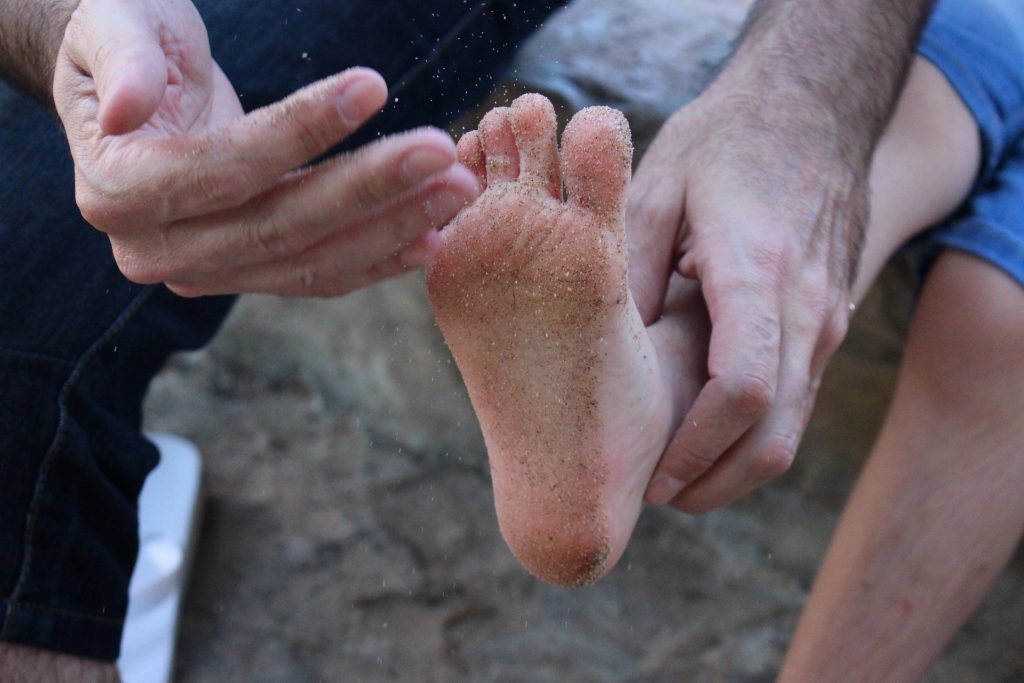Ringworm, despite its name, isn’t caused by a worm — it’s a fungal skin infection that spreads easily and can be stubborn if not appropriately treated. In a city like Naperville, where temperatures and humidity can fluctuate, ringworm can affect anyone—from athletes to children to office workers.
Understanding the causes, symptoms, and appropriate treatment methods can help you get rid of ringworm permanently and prevent it from coming back.
What Causes Ringworm and How Does It Spread?
Ringworm, medically known as tinea, is caused by a group of fungi called dermatophytes. These fungi feed on keratin, a protein found in the skin, hair, and nails. The infection often appears as a red, circular rash with raised edges, accompanied by itching, flaking, or skin cracking.
In Naperville’s active community, ringworm can spread through direct skin contact or by touching contaminated surfaces such as towels, gym equipment, or clothing. Pets, such as cats and dogs, can also carry the fungus.
Maintaining good personal hygiene and avoiding shared personal items are key to prevention. For related insights on how infections spread, see How Is Strep Throat Transmitted?
Common Symptoms
Early detection helps you stop ringworm before it spreads. Common symptoms include:
- Red, ring-shaped rash with a clear or scaly center
- Itching, burning, or irritation
- Peeling or cracking skin in affected areas
- Hair loss or bald spots (for scalp ringworm)
Ringworm can appear anywhere — on the arms, legs, groin, or scalp. If you notice circular patches that seem to grow outward, it’s time to start treatment immediately.
Ringworm Affects Different Body Areas
Ringworm is a versatile fungal infection that can affect several parts of the body, each showing slightly different symptoms. On the scalp, ringworm often appears as scaly, itchy patches that may cause hair to break or fall out, leaving bald spots.
This type is common among children and spreads through shared combs, hats, or pillowcases.
On the body, ringworm typically appears as a red, circular rash with raised edges and a clear center. It can appear on the arms, legs, chest, or back and may cause mild to moderate itching.
Ringworm on the Scalp (Tinea Capitis)
Scalp ringworm causes itchy patches, hair thinning, or bald spots. It’s common among children and spreads easily through shared combs or hats. Using an antifungal shampoo and keeping hair tools disinfected are key preventive measures.
Ringworm on the Body (Tinea Corporis)
This type appears on the arms, legs, or torso as a circular red rash. It may itch or flake, especially in humid environments. Wearing loose cotton clothing helps reduce friction and moisture buildup, which can worsen infection.
Ringworm on the Feet (Athlete’s Foot)
Caused by the same fungal species, athlete’s foot leads to peeling skin and burning sensations between the toes. Always dry your feet thoroughly and avoid walking barefoot in locker rooms or public showers.
Ringworm on the Groin (Jock Itch)
Common in athletes and gym-goers, jock itch spreads through sweat and tight clothing. Using antifungal powders and washing after workouts can help prevent recurrence.
Home Remedies for Relief
Home remedies can play a significant role in managing mild fungal infections. Natural ingredients with antifungal and soothing properties can reduce discomfort, ease itching, and help the skin heal faster.
Coconut oil is one of the most effective natural treatments because it contains fatty acids that break down fungal cell walls. Applying it several times daily helps moisturize the skin while fighting the fungus. Tea tree oil, when diluted with a carrier oil, also helps kill fungi due to its natural antiseptic compounds.
1. Tea Tree Oil
Tea tree oil’s antifungal and antiseptic properties make it effective against ringworm. Mix a few drops with coconut oil, then apply twice daily with a clean cotton pad.
2. Apple Cider Vinegar
Apple cider vinegar helps balance skin pH and stop fungal growth. Dab diluted vinegar on the affected area for 10–15 minutes daily.
3. Coconut Oil
This natural moisturizer soothes dryness and reduces fungal spread. Apply lightly several times a day.
For additional guidance on using safe remedies, you can review Can Natural Remedies Effectively Alleviate Sinus Infection Symptoms?, which shares similar principles about safe, natural care.
Medical Treatments That Ensure Permanent Results
When home remedies aren’t enough, medical treatment ensures complete recovery. Dermatologists in Naperville often recommend topical antifungal creams like clotrimazole or terbinafine for mild infections. For deeper infections, oral antifungal medications may be prescribed.
It’s essential to complete the full course of treatment, even if symptoms disappear early. This prevents the fungus from surviving beneath the skin and causing reinfection. You can learn more about practical medical approaches from What Makes Same-Day Medical Attention Essential for Managing Health Outcomes.
Lifestyle Habits to Prevent Ringworm Recurrence
To prevent ringworm from returning, it’s essential to maintain consistent hygiene and healthy skin habits. The fungus thrives in warm, moist environments, so keeping your skin dry and clean is the first line of defense.
Always dry your body thoroughly after bathing, especially between the toes, under the arms, and around the groin.
Wearing loose, breathable fabrics helps reduce sweating and friction that can irritate the skin. Avoid sharing personal items such as towels, shoes, or clothing, as fungi can linger on these surfaces for long periods. Regularly washing bed linens, gym wear, and socks in hot water helps destroy fungal spores.
Healthy daily habits include:
- Keep your skin clean and completely dry after showering.
- Avoid sharing towels, clothing, or sports gear.
- Wash bed linens weekly in hot water.
- Disinfect gym mats, shoes, and brushes regularly.
- Wear loose, breathable fabrics to reduce sweating.
Building strong hygiene habits is vital. For more ways to prevent infections caused by minor skin breaks, visit What Type of Medical Professional Should You Consult for Scrapes and Minor Injuries?
Environmental and Seasonal Factors
The changing weather conditions in Naperville can significantly influence how fungal infections develop and spread. During humid summers, high temperatures and increased sweating create the perfect environment for fungi to thrive.
Wearing tight clothing or spending long hours outdoors can lead to excess moisture buildup, increasing the risk of infection. In cold winters, layered clothing can trap warmth and moisture against the skin, again encouraging fungal growth.
Heating systems can also dry out indoor air, weakening the skin’s natural barrier and leaving it more vulnerable to irritation and infection.
Warm Weather and Excessive Sweat
During summer, sweat trapped under tight clothes increases moisture and friction. This allows fungi to multiply faster, especially in skin folds. Wearing breathable cotton fabrics helps reduce this risk.
Cold Weather and Layered Clothing
In winter, heavy clothing traps heat and limits airflow. Sweat evaporates slowly, creating the same fungal-friendly conditions. Try wearing moisture-wicking undergarments when layering clothes.
Indoor Humidity and Poor Ventilation
High indoor humidity or prolonged heating can dry out or irritate the skin, weakening its barrier function. Using a humidifier at a moderate level keeps skin balanced and reduces fungal growth.
Gym and Public Spaces
Shared spaces like gyms and pools in Naperville are hotspots for fungal spread. Always wear flip-flops in showers, wipe down equipment, and avoid sharing towels.
Boosting Immunity to Fight
Your immune system plays a significant role in controlling fungal infections. A healthy body fights fungi more effectively, reducing your risk of recurring infections.
To strengthen your immunity:
- Eat foods rich in vitamin C, zinc, and probiotics.
- Get 7–8 hours of sleep daily.
- Stay hydrated and reduce sugar intake.
- Practice stress management techniques like meditation.
To understand how stress and body chemistry affect your health, read Can Daily Short Meditation Sessions Help Control High Blood Pressure?
Holistic and Preventive Measures for Long-Term Relief
Achieving long-term relief from ringworm involves more than treating the infection — it requires caring for your entire body. Strengthening your immune system helps prevent fungal growth and lowers the chances of reinfection.
Eating a diet rich in fruits, vegetables, and probiotics supports your body’s ability to fight harmful microorganisms naturally.
Maintaining daily skin care is another crucial step. Use gentle cleansers, avoid harsh chemicals, and keep your skin moisturized. A clean, balanced skin surface makes it harder for fungi to take hold. Practicing stress management through rest, meditation, or light exercise also supports immune health and skin balance.
Building Stronger Immunity Naturally
Your body’s defense system prevents recurring fungal growth. Eat antioxidant-rich foods, stay hydrated, and get enough sleep. Meditation can help reduce stress, as shown in the study “Can Daily Short Meditation Sessions Help Control High Blood Pressure?”
Natural Skin Protection Habits
Use mild soaps, dry your skin thoroughly, and apply coconut oil or aloe vera regularly to prevent dryness. Avoid harsh products that strip your skin of its natural oils, as this can weaken your natural defenses.
Disinfecting and Cleaning Your Space
Wash clothes, towels, and bedding frequently in hot water. Disinfect gym gear, shoes, and combs weekly. Spores can survive for weeks on fabric if not cleaned properly.
Recognizing Early Warning Signs
If you spot small circular red patches or feel mild itching, treat them immediately with an antifungal cream. Early care prevents the infection from deepening or spreading.

Professional Care and Modern Treatments
While natural methods help, modern medicine ensures permanent recovery and prevention of reinfection. Naperville offers several reliable clinics specializing in skin and fungal care.
Topical Antifungal Creams and Ointments
Doctors often start with clotrimazole, terbinafine, or miconazole creams to eliminate fungal cells. Applying twice daily for 2–4 weeks gives visible improvement.
Oral Antifungal Medications
For severe or recurring cases, doctors may prescribe oral antifungals. These help reach deeper layers of the skin and prevent internal fungal growth.
Laser and Advanced Therapies
Some Naperville dermatology clinics now use low-level laser treatments to kill fungi without damaging healthy skin. This option is ideal for chronic or resistant infections.
When to See a Doctor?
You should seek professional medical help if:
- The rash spreads quickly despite treatment.
- The infection affects the scalp, nails, or groin area.
- You experience persistent itching or pain.
- The infection returns after completing medication.
Doctors can identify the exact fungus through tests and recommend targeted antifungal therapy. Clinics like Aurora Walk-In Immediate Care Medical Clinic Location and Naperville Immediate Care offer fast, walk-in diagnosis and treatment.
Visit Further Information:
- How Is Strep Throat Transmitted?
- Can Natural Remedies Effectively Alleviate Sinus Infection Symptoms?
- What Type of Medical Professional Should You Consult for Scrapes and Minor Injuries
Reliable Medical Information:
For verified medical information, visit Mayo Clinic’s official guide to Ringworm (Tinea): Causes, Symptoms, and Treatments for expert-backed advice on preventing reinfection and ensuring complete recovery.
FAQs
What is the fastest way to get rid of ringworm?
Using antifungal creams such as clotrimazole or terbinafine daily for at least 2 weeks usually clears the infection.
Can home remedies cure ringworm completely?
They can help relieve symptoms and prevent spread, but medical antifungal treatments are often needed for full recovery.
Is ringworm contagious?
Yes. It spreads easily through skin contact, clothing, or contaminated surfaces.
How long does ringworm last?
With proper treatment, most cases heal within 2–4 weeks, but deeper infections may take longer.
Can ringworm return after treatment?
Yes. Reinfection can happen if the fungus isn’t eliminated or hygiene isn’t maintained.
Is it safe to use tea tree oil daily?
Yes, but always dilute it with a carrier oil to prevent skin irritation.
What foods help prevent fungal infections?
Foods rich in vitamins, zinc, and probiotics support skin health and boost immunity.
Can pets give humans ringworm?
Yes. Cats and dogs can carry ringworm fungi and transmit them through contact.
When should I see a doctor for ringworm?
If symptoms worsen, spread rapidly, or affect the scalp or nails, seek medical care immediately.
How do I disinfect my home after a ringworm infection?
Wash clothing, bedding, and towels in hot water and disinfect shared surfaces to kill remaining spores.

